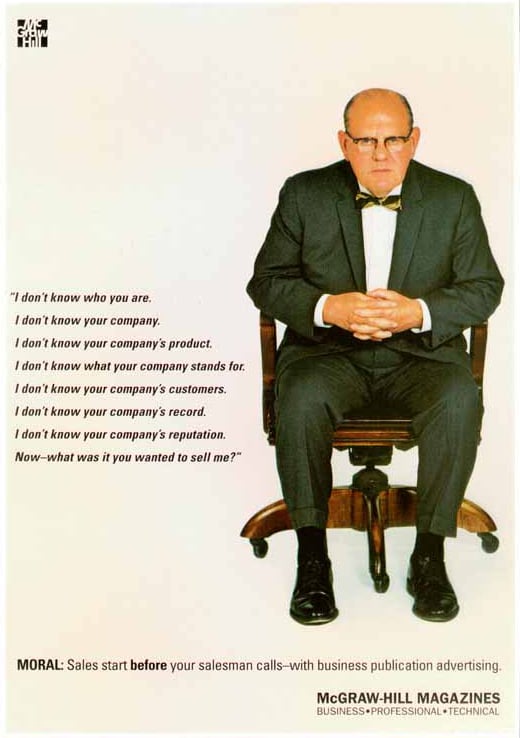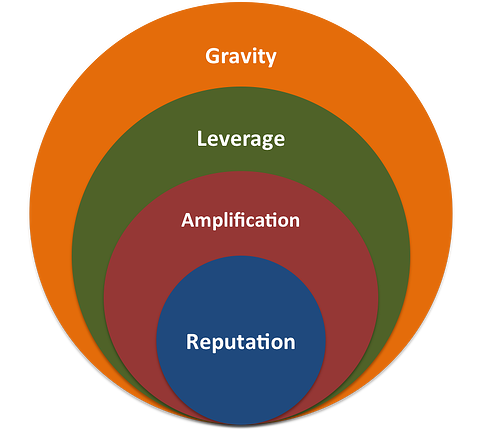 Have you ever been rejected out of hand by a prospect who not only doesn't understand what it is you DO but - as a bonus - also told you they already have it taken care of in-house?
Have you ever been rejected out of hand by a prospect who not only doesn't understand what it is you DO but - as a bonus - also told you they already have it taken care of in-house?
It's like they're saying, "Uh, I don't know what that is, but we already have that here."
This is what I call rejection by ignorance (RBI). And it is one of the most frustrating things you'll run into as a marketing or sales executive - and certainly as an entrepreneurial business owner.
Quick example from my world - and let's see how this story applies to YOU and YOUR products, services and value proposition...
First, a bit of background to set the context. As a marketing speaker and marketing coach, I market and sell to two audiences.
1. For marketing coaching, I market to speakers, consultants, coaches, and independent experts.
2. For speaking, I market to conferences, associations and various industry groups.
After reading this post, you will pick up some tools for marketing YOUR products and services better, smarter and faster - and you'll also see how to avoid one of the STUPIDEST sales rejections ever.
Ready? Strap in - this could get ugly...
Oh, wait...
First, let me share a really good speaker prospecting letter with you. I use this one to get back in touch with speaking clients and also to cross-sell and upsell along the geographic hierarchy (local - state - regional - national) of organizations I've already spoken for.
(All names changed to protect.... well, you know!) Here it is:
=====
Dear Glenda,
I'm hoping you can help me. I'm trying to get in touch with the person responsible for selecting speakers for your [insert organization name] national conferences for two reasons:
1. To invite them to a conversation with me about exploring our possible fit for your speaker roster in 2013 - I presented an extremely well-received keynote at the regional [insert organization name] last year and would love to do more for [insert organization name].
The conference promo from last year is attached for your reference and the special welcome video I did for your group is here: [Youtube link]
2. If a high-energy, high-content marketing program is not a fit, I can recommend several other outstanding professional speakers to you because of my active involvement and leadership roles within the National Speakers Association.
Please do get back to me and let me know your thoughts.
-- David Newman
[Signature block]
=====
So far, so good. And please DO use this letter template above if you're a speaker, consultant, or a professional who uses speaking to generate leads and revenue for your firm.
(And yes, you're very welcome!)
And now here's where things get stupid...
A very nice person forwarded my note to their national HQ. I got this 3-line email from HQ. Please keep your eye out for the aforementioned RBI - rejection by ignorance.
=====
[Nice person] forwarded your email to me. I work with our conferences and events. Because of our arrangement with [corporate HQ], we do not have marketing speakers on our programs. [Our organization] has their own marketing division and provides the marketing support to all offices in the country, so it is not part of our professional development portfolio.
=====
As best as I can tell, she's telling me, "Uh, we have a department that does that."
That's funny because I've spoken for clients like IBM, Microsoft, TD Bank, Merrill Lynch, and Accenture and I'm pretty sure THEY all have marketing departments too!
By this logic, no Fortune 500 company would hire a sales speaker because:
They have a sales department.
No large organization would hire an outside training company because:
They have a training department.
No multi-national corporation would use a recruiting firm because (say it with me, now):
They have a recruiting department.
So what should YOU do to avoid (or recover from) RBI?
Acknowledge it - love it - embrace it.
Corollary: If you can't market and sell to ignorant people who give you stupid excuses, you're going to have a very brief career in sales.
Oh, damn... was this microphone on?
Back to the show...
The tricky part is you never know when you're going to run into this particular brand of stupidity so I don't recommend doing anything differently up front.
Once RBI rears it's ugly head, your best chance at a recovery is what I call CSI. This stands for Complement and Supplement In-house efforts.
Here's a sample phone conversation or an email reply back to little Susie Creamcheese* at the global HQ of the Moron Corporation above:
=====
Susie,
Thank you for your note. I understand completely.
Most organizations that I work with also have a robust marketing department.
They value the programs we collaborate on precisely because I help them with strategies, tactics and tools that complement and supplement what they're already doing in-house.
I'm attaching a brief overview of the program I'm proposing along with 5 testimonial letters from clients in your industry who have a strong central marketing function AND who had great things to say about the results of our work together.
Worth a 10-minute phone conversation? Let me know either way and thanks in advance for considering it.
-- David Newman
[signature block]
=====
BOO-YAH.
Eat that, Jack.
RBI has met CSI and it's game over.
Hope that was as good for you as it was for me.
* Little Susie Creamcheese is a favorite saying of my speaking colleague, David Yoho. Hire him. He's awesome.
* * Grab this free "Sell More Speaking" web training>>




 Like you, I struggle with email.
Like you, I struggle with email. As a small business marketing speaker and small business marketing coach, I know you're probably wearing lots of different hats in your small business, and it's tough to keep all the areas of your business running smoothly all the time.
As a small business marketing speaker and small business marketing coach, I know you're probably wearing lots of different hats in your small business, and it's tough to keep all the areas of your business running smoothly all the time.
 As a marketing speaker and marketing coach, I not only GIVE lots of presentations, I SEE lots of presentations - both at the conferences and meetings I attend and for my clients as we collaborate on improving their OWN speaking and marketing effectiveness.
As a marketing speaker and marketing coach, I not only GIVE lots of presentations, I SEE lots of presentations - both at the conferences and meetings I attend and for my clients as we collaborate on improving their OWN speaking and marketing effectiveness. 


 This email just came across my desk from marketing speaker and marketing coach Machen MacDonald...
This email just came across my desk from marketing speaker and marketing coach Machen MacDonald...
 Here is special treat for you: A 45-minute content-packed interview with marketing coach and professional services marketing expert
Here is special treat for you: A 45-minute content-packed interview with marketing coach and professional services marketing expert  This week's Marketing Jackass Award goes to... me.
This week's Marketing Jackass Award goes to... me.